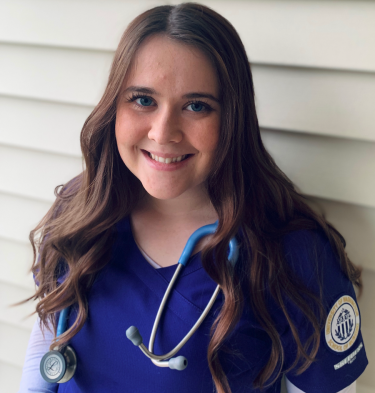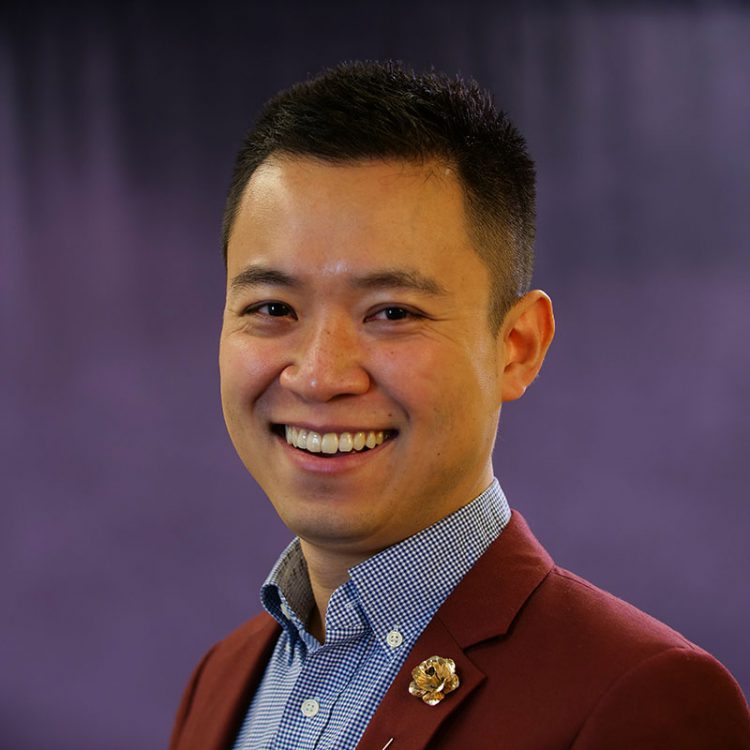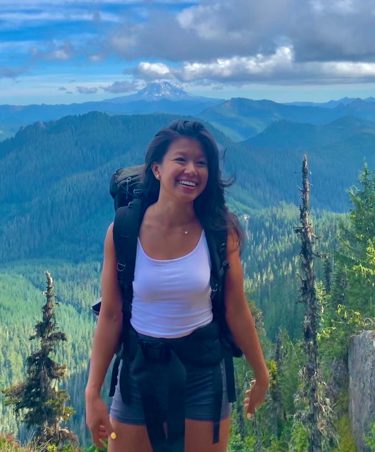National First Gen Day 2021
The University of Washington proudly supports the experiences of first-generation students. For the fifth-straight year, the UW Bothell, Seattle and Tacoma campuses are joining colleges and universities throughout the nation to participate in the National First-Generation College Celebration on November 8, 2021.
Led by the Council for Opportunity in Education (COE) and the NASPA Center for First-Generation Student Success, the day is intended to celebrate the success and presence of first-generation college students, faculty and staff on campuses across the country.
Read more about our first-generation #HuskyNurses
Natalie Nichols
- What challenges did you have to overcome as a first-generation student?

Natalie Nichols, BSN ’22
As a first-generation student, I have overcome the challenges of navigating a complex system that seems to have many unwritten rules.
- Where have you found the support you need to succeed?
I have found the support I need to succeed through community and mentorship. Mentorship has been such an important aspect in cultivating support, such as creating friendships with other first-gen students, connecting with the advising team, and finding role models in your field. Additionally, I am forever grateful for the financial support that scholarships from the UW and SON have provided me. Without scholarships and grants, a college education would not have been possible.
- Why did you choose nursing?
I decided to become a nurse after the incredible nursing care provided when a loved one had passed away. The quote by Maya Angelou “I’ve learned that people will forget what you said, people will forget what you did, but people will never forget how you made them feel” encapsulates the essence of nursing. I may not remember their names, but I still remember years later the comfort, kindness, and compassion of the nurses who cared for my loved one.
- Any advice for other first-gen students?
My advice for other first-gen students is to find a community at UW. For first-gen students interested in nursing, Future Nurses Club is an incredible resource for navigating the UWSON application process. Additionally, don’t be afraid to take risks: apply to that major you don’t think you can get into, apply to that scholarship, or apply to that job. I almost didn’t apply to the UWSON BSN program because I didn’t think I could get in – I am so thankful I took the risk and challenged my doubts.
Tao Zheng
- What challenges did you have to overcome as a first-generation student?

Tao Zheng PhD 2024
I came from China to the US alone with only 100 dollars when I was 24 years old, to pursue education. I was committed to attending college as I knew higher education would help me advance in life and change my family history. I began my university education in a foreign country but also as a foreigner to education itself; neither of my parents completed primary school due to our financial status as a working family. Being thus doubly disenfranchised, I have relied on my strong commitment to education and resilience to face the challenges of navigating the US education system, while overcoming language and cultural barriers, applying for scholarships, working as a tutor, and developing an effective learning style. Experiencing a lack of empathy in mentorship at the beginning of my education in the US, I felt compelled to suppress my identity as a first-generation student and as a student from China. I was quiet in class and isolated from peers. As an undergraduate, I was told that I was not competent and “would never become a nurse.” Another instructor graded me down for being “too gentle” and for “a lack of experience”, even though it was my first-time delivering nursing care. These experiences haunted me whenever I had a difficult time. I questioned my learning ability and the value of leaving my family behind in China to pursue my dreams.
- Where have you found the support you need to succeed?
Throughout my nursing career, I have been fortunate to have met mentors who were willing to help me and provide me with opportunities for my professional growth. When I look back, most of these mentors have a similar background to me. I then turned these negative experiences into motivation to take an active role in developing positive mentorship with students and professionals. I have been an adjunct faculty for the past 6 years for multiple nursing schools in Seattle and mentored nurses in clinical practice in my role as a nurse educator in Chicago. My teaching philosophy guides me to use a humanistic approach to listen, understand, instruct, mentor, and empower individuals in maximizing their potential. I constantly reflect on the similar struggles, determination, and strength of my students’ vision and use my background, behavior, and attitudes to shape and empower students to achieve academic advancement.
- Why did you choose nursing?
I chose nursing because I have always enjoyed being with people and making a difference in others’ life also inspire me (both as a teacher and a clinician). Over the years, I have persevered through the early negative experiences and gained confidence in the value of my contributions as a clinician and instructor who has empathy for struggling patients and students. Having now worked as a nurse for more than 10 years, I have pride in a practice that is informed by scientific knowledge and is grounded in profound caring and compassion. Empathy inspires my close observations of patients and brings my unique insight into the impact of treatment on symptom management. I witnessed patients with advanced heart failure living in a cycle of frequent transitions between care settings, struggling with unmet needs, and distress from inadequately managed symptoms. These observations piqued my interest in pursuing a PhD in Nursing Science. My long-term goal is to use my PhD research findings to develop interventions for symptom management to improve the quality of life in individuals with advanced heart failure.
- Any advice for other first gen students?
Find some great mentors and keep in touch with them through your career. Jump on any opportunities offered to you and enjoy the ride (and learning and growth).
Shwe Zin
-

Shwe Zin, ABSN ’22
What challenges did you have to overcome as a first-generation student?
The biggest challenge I had to overcome as a first-generation student was imposter syndrome. To be entirely honest it is still something I continue to struggle with. When you are in a space where there are very few people with similar backgrounds, it is easy to feel like you don’t belong. Fortunately, I’ve learned that some of the most capable people struggle with this. I try my best not to let imposter syndrome get in the way of my aspirations. Another challenge of being a first-generation student is having to balance my personal pursuits with serving my community and providing for my family. When you are a first-generation student, your dreams are not yours alone. They are also your family’s and your community’s. The challenges of being a first-generation student are not limited to the education system. I’ve had to navigate a myriad of challenges that include financial literacy, mental health, and the professional world. There are so many skills needed to be successful in the real world that my parents cannot teach me because they’ve never had the opportunity to learn for themselves. Despite these challenges, I feel proud and privileged to have the opportunities to learn these skills and gain knowledge that not only helps me, but my family and my community to lead healthier and happier lives.
- Where have you found the support you need to succeed?
My first line of support has always been my family. They are the ones I call on for comfort and encouragement whenever school becomes overwhelming. They are also my main motivation for my educational pursuits. If my parents can leave everything they knew and loved behind to navigate an entirely new country for me, I can do this for them. I also get my strength from my community and the younger generation of first-generation students. I want to be able to go through as many challenges as I can so the path for them will be a little bit easier. The biggest support I’ve received is from my mentors. I cannot stress the value my mentors have had in my life. I would not be where I am here today without them. I have also found support in all the organizations that provide resources for low-income, underrepresented, first-generation students. They’ve provided me with financial support, tutoring services, and experiences I would not otherwise have. These programs and organizations remind me that there are a lot of people rooting for my success.
- Why did you choose nursing?
Ever since I can remember, I loved the act of caretaking. Anytime someone around me got hurt, I would sprint home as fast as possible to grab a box of band-aids. One time my sister got a paper cut on her tongue, and I ran to her with a Band-Aid. She couldn’t stop laughing at me, while I stood there confused with a band-aid in hand. At that age, I believed band-aids could fix anything. As I grew older, I happily took on the role of a nurse when someone in my family fell ill. This meant preparing a bowl of ice-cold water and a clean towel to place on their forehead, making a bowl of rice porridge, getting the medicine, cleaning them, feeding them, and massaging them. The feeling of being protected, comforted, and taken care of at my most vulnerable, both physically and mentally, is one of the most powerful acts of love I have ever experienced. It is a feeling that I want to provide for others. This was the basis of my passion to pursue a career in healthcare. Since starting nursing school, I am learning that this profession is so much more than being a caretaker. It is also being an advocate, an activist, and a teacher. The more I learn about the nursing profession, the more I feel confident that this is the perfect career for me. I have never felt my core values and worldviews to be more aligned than that of nursing.
- Any advice for other first-gen students?
My advice for other first-generation students is to remember that you are not alone. I know it can feel lonely navigating this education system, especially when you are the first in your family to do so. Have the courage to reach out to other first-generation students and share your common struggles. Don’t be afraid to tap into resources that are meant for you. Be brave enough to take on the role of the trailblazer for your community. None of this is supposed to be easy. But you are capable. And you belong here. Most importantly, remember to take care of yourself. We cannot uplift our communities if we do not first take care of our mental and physical health. Do not lose your joy in the midst of all of this. We are all rooting for you.